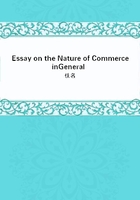
第38章
The cost of transport increases a good deal the prices of things sent to distant countries; but these costs are very moderate in maritime states, where there is regular shipping to all foreign ports so that Ships are nearly always found there ready to sail which take on board all cargoes confided to them at a very reasonable freight.
It is not so in states where navigation does not Nourish.
There it is necessary to build ships expressly for the carrying trade and this sometimes absorbs all the profit; and navigation there is always very expensive, which entirely discourages trade.
England today consumes not only the greatest part of its own small produce but also much foreign produce, such as Silks, Wines, Fruit, Linen in great quantity, etc. while she sends abroad only the produce of her mines, her work and manufactures for the most part, and dear though labour be owing to the abundance of money, she does not fail to sell her articles in distant countries, owing to the advantage of her shipping, at prices as reasonable as in France where these same articles are much cheaper.
The increased quantity of money in circulation in a state may also be caused, without balance of trade, by subsidies paid to this state by foreign powers, by the expenses of several ambassadors, or of travellers whom political reasons or curiosity or pleasure may induce to reside there for some time, by the transfer of the property and fortune of some Families who from motives of religious liberty or other causes quit their own country to settle down in this state. In all these cases the sums which come into the state always cause an increased expense and consumption there and consequently raise the prices of all things in the channels of exchange into which money enters.
Suppose a quarter of the inhabitants of the state consume daily meat, wine, beer, etc. and supply themselves frequency with cloths, linen, etc. before the increase in money, but that after the increase a third or half of the inhabitants consume these same things, the prices of them will not fail to rise, and the dearness of meat will induce several of those who formed a quarter of the state to consume less of it than usual. A man who eats three pounds of meat a day will manage with two pounds, but he feels the reduction, while the other half of the inhabitants who ate hardly any meat will not feel the reduction. Bread will in truth go up gradually because of this increased consumption, as I have often suggested, but it will be less dear in proportion than meat. The increased price of meat causes diminished consumption on the part of a small section of the people, and so is felt; but the of a small section of the people, and so is felt; but the increased price of bread diminishes the share of all the inhabitants, and so is less felt. If 100,000 extra people come to live in a state of 10 millions of inhabitants, their extra consumption of bread will amount to only pound in 100 which must be subtracted from the old inhabitants; but when a man instead of 100 pounds of bread consumes 99 for his subsistence he hardly feels this reduction.
When the consumption of meat increases the farmers add to their pastures to get more meat, and this diminishes the arable land and consequently the amount of corn. But what generally causes meat to become dearer in proportion than Bread is that ordinarily the free import of foreign corn is permitted while the import of Cattle is absolutely forbidden, as in England, or heavy import duties are imposed as in other states. This is the reason why the rents of meadows and pastures go up in England, in the abundance of money, to three times more than the rents of arable land.
There is no doubt that Ambassadors, Travellers, and Families who come to settle in the state, increase consumption there and that prices rise in all the channels of exchange where money is introduced.
As to subsidies which the state has received from foreign powers, either they are hoarded for state necessities or are put into circulation. If we suppose them hoarded they do not concern my argument for I am considering only money in circulation.
Hoarded money, plate, Church treasures, etc. are wealth which the state turns to service in extremity, but are of no present utility. If the state puts into circulation the subsidies in question it can only be by spending them and this ill very certainly increase consumption and send up all prices. Whoever receives this money will set it in motion in the principal affair of life, which is the food, either of himself or of some other, since to this everything corresponds directly or indirectly.